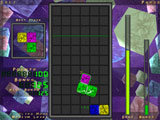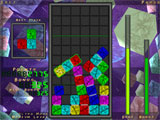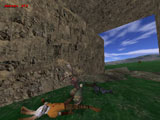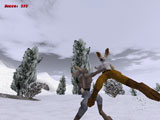New Page: List of Physics Games
I added a new page available from the sidebar of the site: List of Physics Games. It’s an index of all of the games reviewed so far on the site. For those of you just discovering Fun-Motion this is a great way to look over all of the old posts at a glance.
Also new are the Related Posts links and the social bookmarking quick links for those of you who use del.icio.us, Digg, or one of the other online bookmark sites.
One-Part Tetris, One-Part Physics: Triptych
Triptych by Chronic Logic plays like a physically uninhibited version of drop-puzzlers like Tetris or Super Puzzle Fighter. The core premise from these games remains–you must align various falling pieces so that same-color blocks touch. Where games like Tetris rely on a fixed grid, though, Triptych utilizes free-moving physics. Pieces bounce, squish, and stack in irregular ways rather than perfectly aligning themselves.
Controls are keyboard based: arrow keys move your piece, and A/D rotates it left and right. You have a certain amount of time to place the current piece, after which it will drop by itself (you can also place space to drop the piece early). If the stack of blocks is too high at the end of your piece placement you lose. This is an interesting failure state, because you can actually mash the pieces down very quickly and then hit space to drop the piece. Technically the piece placement is valid even if the board quickly rebounds above the containment mark. Of course, at this point you need to very quickly figure out how to make room for the next piece.
I question the decision to use keyboard controls. As a player I’d much rather grab and throw pieces around with the mouse in a more intuitive fashion. I think the game would be faster-paced and much more accessible with mouse-only controls, too. Requiring a casual player to utilize 7 different keys to play the game is a bit demanding.
The game rules in Triptych are simple. When three blocks of the same color touch they will vanish. The game features a fairly standard combo system. If you make successive matches within a certain timeframe they count as a combo for increased points.
The biggest problem I have with Triptych is the game’s pacing. Stacking pieces into an empty playing field is fun, at first, but quickly becomes dull. The problem with the game is that things don’t get very interesting until the playing field is nearly full, and by this time you’re very near to failing. If the end-game pacing could somehow be elongated so that pressure could build at a slower pace I think the game would be a lot more enjoyable.
All things considered, Triptych is a neat implementation of the well-worn drop-puzzler genre. Physics really do spice things up and add to the game’s replayability. If you’ve ever wished you could mash pieces around and bend the rules in a game like Tetris definitely give Triptych a try.
A 4-level Triptych game demo is available here (1.60MB) or over at the Chronic Logic website (Windows, MacOS, Linux).
Related Posts:
- Gish 2 Announced!
- The Beginning
- Gish, The Father of Physics Platformers
- A Classic: Bridge Builder by Chronic Logic
- The Pinnacle of Breakout Games: BreakQuest
Physics in a Rabbit Fighting Game?
Lugaru isn’t exactly a physics game. There isn’t an easy yes/no test as to what constitutes physics game; it’s a sliding scale. Obviously even the most rudimentary of game mechanics can have physics-based game elements. Super Mario Brothers for the NES has a simplistic view of gravity, collisions, and collision responses. I like to define physics games as games where the primary player interaction is manipulation of a complex physics system.
Primarily, Lugaru is a fighting game of sorts. It was recommended to me because of its ragdoll physics, though. And, to be fair, its use of ragdoll is more integrated into game play than many titles today. Game characters will move in and out of ragdoll in response to strikes, whereas most games simply revert to ragdoll as an end state. Still, a Lugaru player’s second-to-second concern isn’t manipulation of a physics system.
So why am I talking about Lugaru, then, if it isn’t a physics game? It was recommended to me by Joacim “Zero” Möller with the following wording:
I wanna suggest the game Lugaru that is a fighting gam with rabbits. It has some great ragdoll physics and is a truly great game.
Here we have a man claming the seemingly impossible–that there is a highly entertaining rabbit fighting game already in existence. I had to check it out, and I am pleased to report that Lugaru is exactly what it purports to be. It is a fighting game with rabbits, and a unique one at that.
Lugaru plays out as a rock-paper-scissors sort of fighting game. Opponents can parry your moves, and in turn you can counter their parries. The game’s control scheme is a little convoluted, but it has some neat twists. You can pick up some weapons when you roll over them, perform aerial flips, jump off walls, “animal” run in order to tackle an opponent, and so on. Check out the in-game tutorial for an exhausting run-down of the options.
As I mentioned, the physics in Lugaru compliment the gameplay rather than constitute it. You can toss dead ragdoll enemies at other opponents, and keeping an enemy in their ragdoll state longer will allow you to land more cheap blows. All told, though, Lugaru isn’t so much about the physics as it is about the fighting rabbits.
The production values are fairly low, even by independent development standards, but Lugaru has that special spark. It’s just fun to play. It’s compelling entertainment when you steal a knife off one attacking rabbit in order to plunge it deep within the furry bowels of another.
The man behind Lugaru, David Rosen, is leading up development on Lugaru 2. He comments, “It was more popular than expected, so I am going to make a sequel with a full team so that it can reach its full potential.” I do worry that they seem too enamored with developing their own engine and technology rather than simply utilizing pre-built libraries and focusing on the actual game, but I hope they see it through. If Lugaru is any benchmark the world absolutely needs another, better physics-based rabbit fighting game.
Download the Lugaro demo for Windows here (23.5 MB)
Or, head on over to Wolfire Software’s page for more screenshots, movies, and versions of Lugaru for MacOS and Linux. The full version of the game is available for $19.99
Related Posts:
- Walaber Experiments with Ragdolls and Aerial Skiing
- Physics-Based Beatdowns, Ragdoll Masters
- I Know Rag Fu: Ragdoll Matrix Reloaded
- Rubber Ninjas Gameplay Teaser
- Nimble Ninjas Face Ferocious Foes



 (Rate this game! 61 votes, average: 3.43 out of 5)
(Rate this game! 61 votes, average: 3.43 out of 5)



 My name is Matthew Wegner, and this site is dedicated to physics games.
My name is Matthew Wegner, and this site is dedicated to physics games.